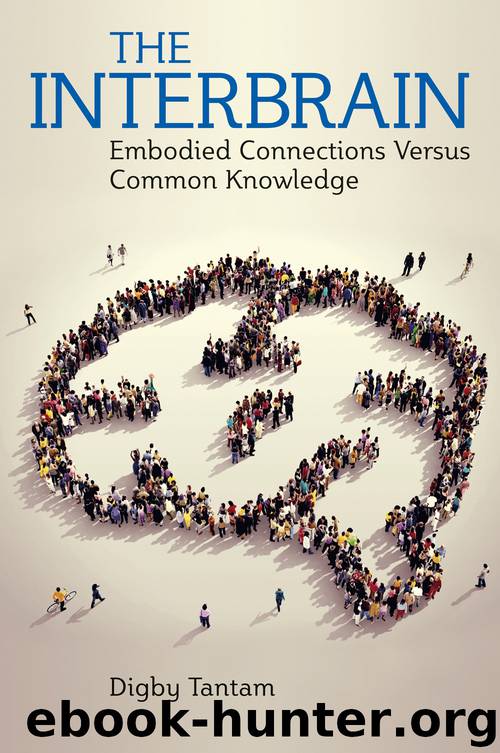The Interbrain by Tantam Digby;

Author:Tantam, Digby;
Language: eng
Format: epub
ISBN: 9780857008565
Publisher: Jessica Kingsley Publishers
Published: 2017-12-23T16:00:00+00:00
Cooperation and coordination
Surowiecki4 discusses three types of outcomes of these collectivities, which he calls extended minds: calculation, described above, requires a special form of collective decision-making but not one involving crowds as I am defining them; cooperation; and coordination. Surowiecki’s example of coordination is of how individuals move through flocks of people, for example on pavements or in restaurants.*
Surowiecki gives several examples of coordination in action in supply chains, for example how food production adjusts to food packaging, transport, and sales, each of which affect the speed of transmission down the chain and therefore the amounts of food demanded. He considers these to be an example of the ability of crowds to cooperate. This kind of cooperative activity is remarkable, but it depends on a multitude of individual transactions and individual predictions rather than a mass action of a coordinated group of people.
Each of these transactions does, however, require the people in that transaction to be connected to each other by a theory of mind that enables the motives of each of the parties to be considered. When the packager says that he cannot take as much chicken because it is too hard to get labour on the production line, is he saying this because he is taking chicken from some other farm at a lower unit price? Or is there a reduced demand for chicken, and the packager is switching to turkey? Such human insights ensure that longer term changes in supply and demand can be anticipated.
There need be no real connection between the people in the supply chain. The coordination is implicit in its efficient functioning at times of change. Coordination is more obviously required if people need to work together. Revolutions are often cited in discussions of the risks and benefits of coordination. Repressive regimes almost always have some opponents who may be shot, imprisoned, or silenced in some other way by the regime without regime change taking place. These individuals know the risks and are rarely motivated by the expectation that they will be successful. Regime change requires mass protests or mass violence, but mass protests and mass violence require the involvement of people who are willing to endure the regime rather than put themselves at risk. Repression by the regime is designed to maintain the common knowledge that revolution will not succeed. So revolution can only happen when that common knowledge gets replaced by the common knowledge that revolution is possible without substantial risk to the participants. There may even be a tipping point at which the common knowledge becomes known: ‘The revolution will certainly succeed, and those who are seen to be supporting it will benefit.’
‘Common knowledge’ is also fundamental to any kind of social interaction in which one stranger may benefit or lose and the other or others may lose or gain reciprocally. To stand the best chance of gain, one party needs to know how the other party will react but, since the other party is a stranger, they must base this
Download
This site does not store any files on its server. We only index and link to content provided by other sites. Please contact the content providers to delete copyright contents if any and email us, we'll remove relevant links or contents immediately.
| Allergies | Asthma |
| Autism & Asperger's Syndrome | Cystic Fibrosis |
| Down Syndrome | Eating Disorders |
| Epilepsy | Learning Disorders |
| Lice | Special Needs Children |
I Capture the Castle by Dodie Smith(1571)
Aspergirls by Rudy Simone(1361)
Be Different by John Elder Robison(1330)
Autism's False Prophets by Paul A. Offit(1238)
My Child's Different by Elaine Halligan(1229)
Smart but Scattered—and Stalled by Richard Guare(1193)
What's Making Our Children Sick? by Michelle Perro(1155)
101 Tips for the Parents of Boys with Autism by Ken Siri(1151)
Asperger Syndrome (Autism Spectrum Disorder) and Long-Term Relationships by Ashley Stanford(1112)
ADHD by Mark Selikowitz(1105)
An Adult with an Autism Diagnosis by Gillan Drew(1070)
Girlish by Lara Lillibridge(1067)
Nerdy, Shy, and Socially Inappropriate by Cynthia Kim(1053)
Animal-assisted Interventions for Individuals with Autism by Temple Grandin(1035)
On Immunity: An Inoculation by Biss Eula(1027)
Seeing Ezra by Kerry Cohen(1004)
Overcoming ADHD by Stanley I. Greenspan & Jacob (con) Greenspan(990)
Why Gender Matters by Leonard Sax M.D. Ph.D(981)
Sarah's Child (Hqn Romance) by Linda Howard(977)
